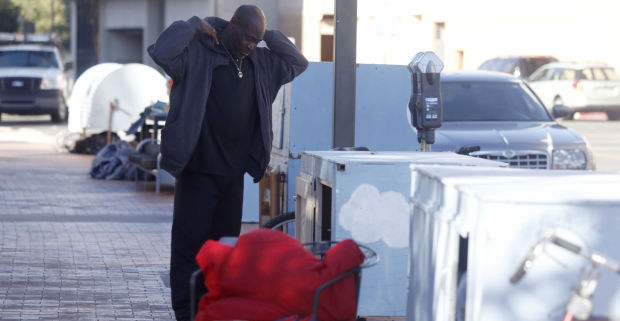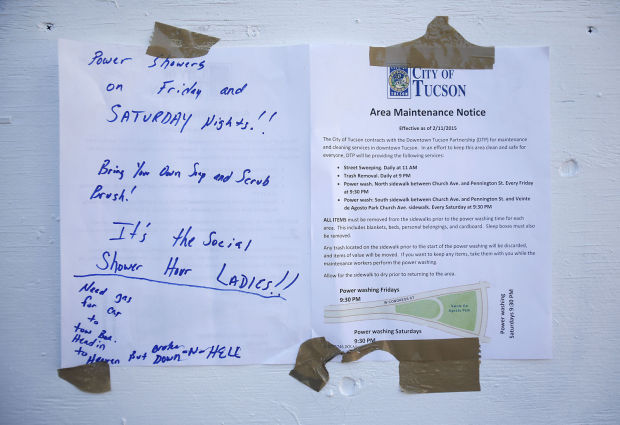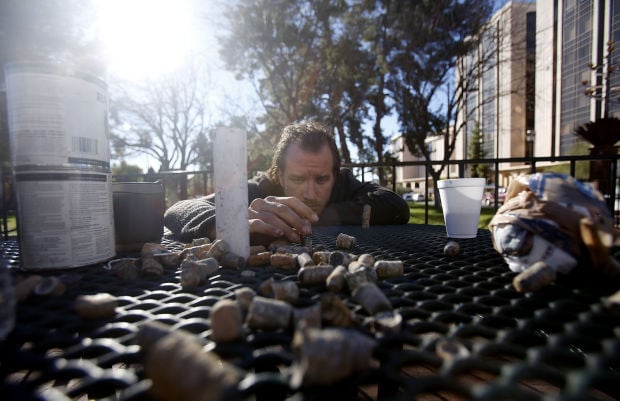The expanding homeless encampment at the west end of downtown, and the city’s perceived lack of response to it, has county officials concerned about potential health and public safety risks.
Visitors to the area, particularly at the county government complex, regularly have to step around, and smell, piles of excrement, both human and animal.
And the significant number of often-unleashed dogs accompanying the homeless occupants are considered a potential threat.
Last week, Pima County Supervisor Ray Carroll’s dog was attacked by three unleashed dogs on Congress Street in front of the county Administration Building.
A memo from county Health Department Director Francisco Garcia addresses the county’s concern with human waste in the downtown area.
“In response to numerous complaints from the public, on January 30, 2014 at approximately 1 p.m. inspectors from the Consumers Health and Food Safety program in the Health Department found numerous violations of the statute pertaining to disposal of human excreta and urination on public sidewalks and property,” Garcia wrote.
Inspectors found and mapped 11 areas on the county’s main government complex where feces and urine were found.
County workers have been directed to clean and sanitize areas where waste is found on county property.
But most of the affected areas fall within city jurisdiction.
Police Chief Roberto Villaseñor and other city officials met with people living in the park Tuesday morning to talk about scheduled maintenance and cleaning.
Michael Keith, CEO of the Downtown Tucson Partnership, said his organization has posted new schedules for trash pickup and power washing of sidewalks.
“I think you’re going to see that area well-maintained on a regular basis,” Keith said.
However, police will accompany Downtown Tucson Partnership workers during clean-ups to help avoid any conflicts. Chris Kaselemis, the city program director for economic initiative, said he was told the police presence is necessary because workers cleaning the area in the past have been threatened and harassed by those camping there.
The city’s response to the encampment has been muted since U.S. District Judge David C. Bury issued a ruling in December, in a suit filed by camp organizer Jon McLane, restricting the city’s actions in the Veinte de Agosto Park area, where most of the camp is set up.
The order effectively allows people to remain in the park during the day and on the sidewalks throughout the night as part of their First Amendment rights of free speech. It prevents police from removing people from the park and sidewalk areas, and allows people to sleep on the sidewalks as long as five feet are left open for passers-by.
Since the ruling, the city has taken a largely hands-off approach, not just in the area covered by the order, but in the surrounding streets as well.
After the judge ruled in favor of the camp, McLane in January began installing “dream pods,” or 6-foot-long wooden boxes for homeless people to sleep in.
The number of dream pods has grown in recent weeks, with 19 now lining Congress Street, Broadway and Church Avenue. In addition, at least six tents have been set up along the streets.
A futon sofa, table and chairs also have been installed along Church in front of the park. Clothing is often draped over fencing at the adjacent streetcar stop.
McLane said the movement has centered on the park because many homeless people are not accepted at shelters because they have pets, travel with spouses or have a mental illness.
Carroll said he often brings his 3-year-old schnauzer, Simon, to work. But when he took the dog out for a walk on Friday, Carroll said, “He was just sniffing around and — boom! — a couple of mixed breeds and pit-bull types came after him,” Carroll said he was able to pull Simon away before he was injured.
A Pima Animal Care Center enforcement officer who responded to the incident issued the woman whose dogs tried to attack Simon a citation for not having them properly licensed or vaccinated for rabies.
Pima County Administrator Chuck Huckelberry said the incident highlights the growing public safety and health concerns when more and more homeless people with animals take up residence.
“I do think there’s a problem with the dogs,” he said. “How can you say they’re being sheltered when they’re on public property?”
McLane, who characterizes the assembly as a protest against the treatment of homeless people rather than a homeless camp, said he was aware of the incident with Carroll’s dog and has been in contact with area animal-rescue organizations in an effort to get homeless residents’ dogs vaccinated.
He said city and county officials used the unlicensed and unvaccinated pet issue in the past in an effort to roust people from the park.
“That’s something we’ve seen before,” he said.
McLane said he asked the city to give him a permit to install portable toilets near the park, but officials were unwilling.
“They for some reason have refused to have 24-hour facilities,” he said.
He said the Circle K near Interstate 10 and Congress has cooperated by allowing people to use its restroom.
He’s also proposed that the city establish at least one 24-hour parklike area in each city ward where homeless people could live. He said the areas could be simply dirt lots with bathroom facilities and other services where people can live in tents or other temporary structures.
Tucson police referred questions on the matter to the City Manager’s Office.
Kaselemis said the legal ruling complicates the issue, but city officials hope for a solution.
“Particularly from an economic development standpoint and resurgence of downtown, it doesn’t help businesses to see this happening,” he said.
City officials have asked Bury to revisit his ruling, but no action has been taken on that issue.








